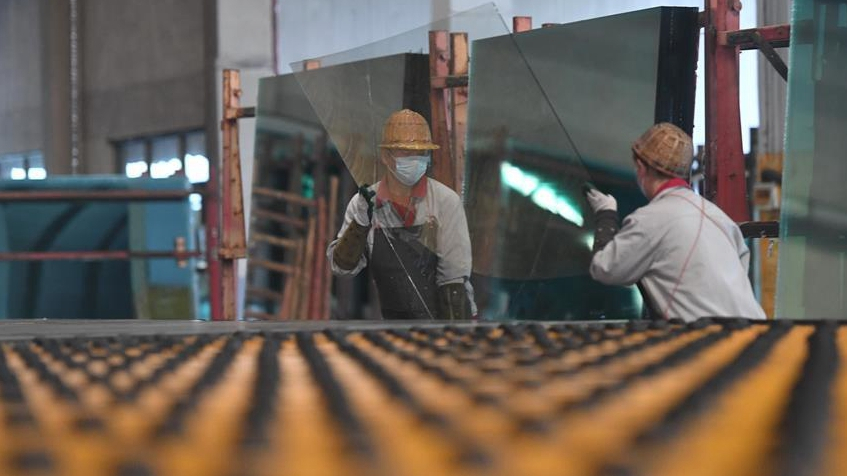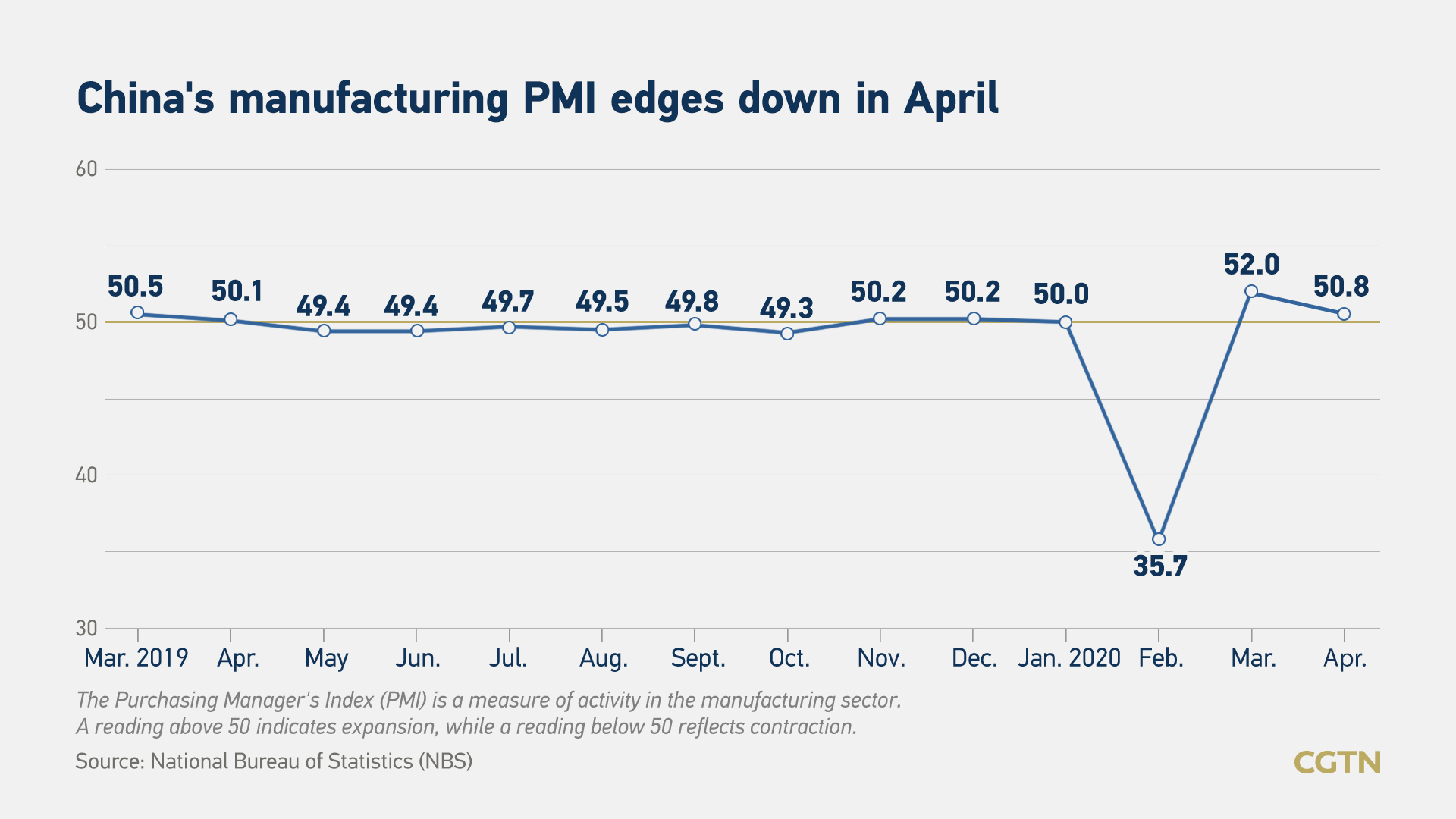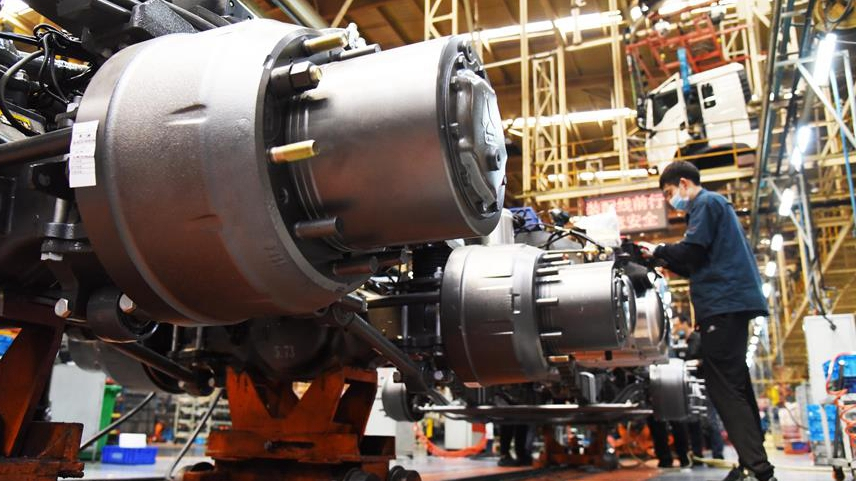01:45

China's official Purchasing Managers' Index (PMI) edged down to 50.8 in April from a record high of 52 in March due to a weak recovery in demand as well as uncertainties in the foreign trade market, data from the National Bureau of Statistics (NBS) showed on Thursday.
But the figure, above the 50-point mark, indicated the economy is still in the process of a steady recovery under the pandemic. A Reuters poll earlier expected the PMI to fall to 51 in April, rising for a second straight month after a historic fall of 35.7 in February.
The resumption of production steadily continued in April, with small, medium and large enterprises all on the recovery track, NBS senior statistician Zhao Qinghe said.
The production index was 53.7 percent, 0.4 percentage points lower than last month. The employment index was 50.2 percent, increasing for two consecutive months.
The PMI of large and medium-sized enterprises was 51.1 percent and 50.2 percent respectively, down 1.5 and 1.3 percentage points from the previous month. Meanwhile the PMI of small enterprises was 51.0 percent, an increase of 0.1 percentage points on the previous month, said Zhao.

Recovery in demand lags behind production
The recovery in demand is weaker than production, dragged by the coronavirus pandemic. The new orders index was 50.2 percent, down 1.8 percentage point than the previous month and lower than the production index.
Among the 21 industries surveyed, the new orders index in 15 industries such as textiles and chemical raw materials was lower than the production index, and the industry demand recovery lagged behind production, said Zhao.
The survey shows that 57.7 percent of companies said the orders are insufficient. Product sales are facing difficulties and replenishment will take time.
"The headache currently is transforming from epidemic control to insufficient demand," said Wu Ge, Chief Economist of Changjiang Securities.
The finished goods inventory index registered 49.3, up 0.2 percentage points on the previous month, indicating a weaker demand and an excess inventory, Wu told CGTN.
Meanwhile, Cai Jin, the vice-chairman at the China Federation of Logistics and Purchasing said that China needs to increase internal demand to counter declining global demand.
"New export orders dropped 40 percent from last month, reflecting the spread of the coronavirus around the world and the impact on the Chinese economy is evident. In the short term, we need to increase internal demand to counter the demand shock from abroad," said Cai.
Uncertainties in foreign trade market
Uncertainty in the import and export market has increased. The spread of the pandemic has sharply contracted global economic activities. The new exports order index and imports index were 33.5 percent and 43.9 percent, down 12.9 and 4.5 percentage points from the previous month.
Some manufacturing companies reported a sharp decrease in newly signed export orders, and even orders that have already started production have been cancelled, said Zhao.

An employee works at an assembly line of China National Heavy Duty Truck Group Co., Ltd. in Jinan, capital of east China's Shandong Province, April 28, 2020. /Xinhua
An employee works at an assembly line of China National Heavy Duty Truck Group Co., Ltd. in Jinan, capital of east China's Shandong Province, April 28, 2020. /Xinhua
China's imports and exports are still facing severe challenges as the pandemic is developing overseas, posing threat to the foreign trade market. Therefore, shocks in external demand will be more obvious in the second quarter of the year, Wu told CGTN.
"The manufacturing sector makes a large contribution to employment, especially the small and medium businesses and private businesses, and it's very sensitive to foreign demand," said Wu.
"The new orders index, especially the new exports order index which reads 33.5 percent, is sharply contracted from the previous month and far below the 50-point mark," said Wu.
Wu also said that shocks in external demand will be outstanding in the second quarter, so policy measures are needed. "The impact of the coronavirus on the domestic economy is more severe than during the subprime mortgage crisis when China took strong stimulus measures. So for this time, counter-cyclical policy is essential and urgent to cushion the adverse impact," said Wu.
Next few months will be bumpy for businesses in China
"Looking ahead in the months to come the situation is not so optimistic. Recoveries in the West will take longer than expected," Wang Jianhui, general manager of the R&D department of Capital Securities told CGTN.
China's economy has begun to open up again as authorities loosen lockdown restrictions. But other major economies, including the U.S. and Europe, remain in the grip of the pandemic amid increasing infections and deaths.
"April reading gave us some comfort and relief, overall business confidence remains stabilized, obviously government stimulus has kicked in. More importantly employment is on its way for a quick recovery. More people returning to work means companies are able to speed up their delivery and the economy is on its way to recovery," said Wang.
Construction and service activities expand at a faster pace
The official non-manufacturing Purchasing Managers' Index (PMI) rose to 53.2 in April, from 52.3 in March, thanks to the quickened resumption of related industries.
In particular, the construction business activity index surged 4.6 percentage points from the previous month to 59.7. The service business activity index rose 0.3 percentage points to 59.7. The new orders index of services businesses was up 2.6 percentage points to 51.9.
However, Zhao cautioned that the resumption of production in some industries still lags behind though the services business activity index has rebounded for two consecutive months. Industries such as accommodation, culture, sports, entertainment, and resident services have been greatly affected by the epidemic with the business activity index below 45.0 for three consecutive months.
(Michelle Van den Bergh also contributed to the story.)
(Cover image: A workshop of a glass company in Nanhe County, north China's Hebei Province, April 29, 2020. /Xinhua)